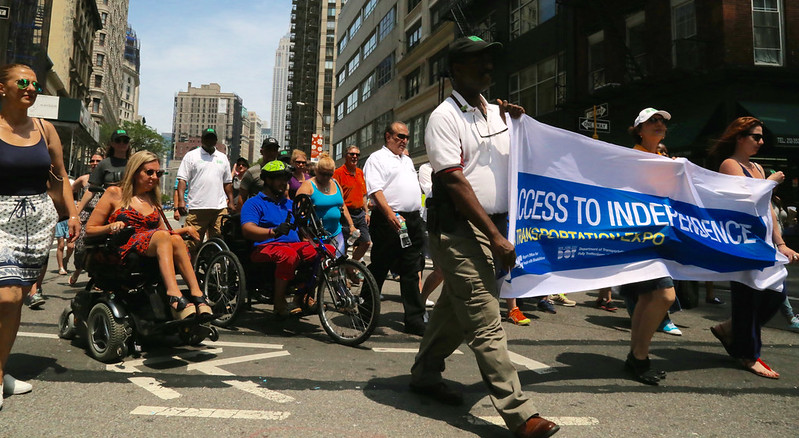“Paying workers with disabilities a subminimum wage is discrimination—plain and simple—and it’s way past time we repeal this outdated policy.”
By Kenny Stancil, staff writer for Common Dreams. Published 9-17-2020

NYC DOT joined the Mayor’s Office for People with Disabilities in the first ever Disability Pride NYC Parade on Sunday, July 12, 2015. Photo: NYC DOT/flickr/CC
The U.S. Commission on Civil Rights’ recommendation that Congress repeal Section 14(c) of the Fair Labor Standards Act—which allows employers to pay employees with disabilities less than the federal minimum wage—was praised Thursday by numerous Democratic lawmakers.
According to the USCCR’s report—titled “Subminimum Wages: Impacts on the Civil Rights of People with Disabilities” (pdf)—there are over 1,500 “sheltered workshops,” separate work centers where employees with disabilities are “not integrated into a broader community or work setting,” in the U.S. that employ over 100,000 people.
Additional data in the report showed that between 2017 and 2018, the average wage of a person with a disability employed under what is known as a 14(c) certificate was $3.34 per hour. With the average number of hours worked only 16 hours per week, the average 14(c) worker earned just $53.44 per week, or $213.76 per month.
Rep. Bobby Scott (D-Va.), chairman of the House Committee on Education and Labor, said that “the Commission’s report reveals what we already know to be true: Subminimum wages for people with disabilities are antiquated and inherently discriminatory.”
Chairman @BobbyScott: “The Commission’s report reveals what we already know to be true: Subminimum wages for people with disabilities are antiquated and inherently discriminatory.” https://t.co/aaeFuuAQ0a
— Committee on Education & Labor (@EdLaborCmte) September 17, 2020
The office of the Senate Committee on Health, Education, Labor, and Pensions (HELP) noted that the 14(c) exemption subjected workers with disabilities to segregation and discrimination—”in direct conflict with modern disability policy, including the Americans with Disabilities Act, the Rehabilitation Act of 1973, the Workforce Innovation and Opportunity Act, the Individuals with Disabilities Education Act, and the Olmstead Supreme Court case.”
“Although Congress enacted the program with good intentions,” the USCCR said in its report, “the Department of Labor’s enforcement data as well as several key civil rights cases and testimony from experts show that with regard to wage disparities, the program is rife with abuse and difficult to administer without harming employees with disabilities, as reflected in over 80% of cases investigated.”
The USCCR wrote that paying subminimum wages to workers with disabilities—an “antiquated” practice “enacted prior to our nation’s civil rights laws”—prevented participants “in the program from reaching their full potential while allowing providers and associated businesses to profit from their labor.”
Sen. Patty Murray (D-Wa.), ranking member of the Senate HELP Committee, applauded the USCCR’s report for revealing civil rights violations and endorsed its recommendation to bring an end to the use of subminimum wages for people with disabilities.
“Paying workers with disabilities a subminimum wage is discrimination—plain and simple—and it’s way past time that we repeal this outdated policy,” Murray said. “For too long, some workers with disabilities have been relegated to subminimum wage jobs where they are segregated from their peers and paid far too little.”
.@USCCRgov agrees: paying workers with disabilities a subminimum wage is discrimination—plain and simple—and it’s way past time we repeal & phase out this outdated policy. Congress’ first step: passing the #RaiseTheWage Act.https://t.co/0bcKSfOOhe
— Senator Patty Murray (@PattyMurray) September 17, 2020
Both Scott and Murray—a lead co-sponsor of the Raise the Wage Act, which would increase the federal minimum wage to $15 by 2024—highlighted the importance of passing legislation that will, in Murray’s words, “ensure… all workers—including workers with disabilities—are paid fairly.”
The USCCR stressed that “the phased repeal of 14(c) must not reflect a retreat in federal investments and support for employment success of persons with disabilities but rather a reconceptualization of the way in which the federal government can enhance the possibilities for success and growth for people with disabilities.”

